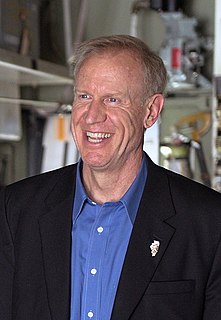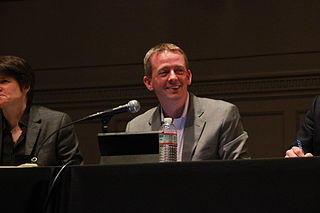A Quote by Tyler Cowen
If one sentence were to sum up the mechanism driving the Great Stagnation, it is this: Recent and current innovation is more geared to private goods than to public goods. That simple observation ties together the three major macroeconomic events of our time: growing income inequality, stagnant median income, and the financial crisis.
Quote Topics
Crisis
Current
Driving
Events
Financial
Financial Crisis
Goods
Great
Growing
Income
Income Inequality
Inequality
Innovation
Major
Mechanism
Median
More
Observation
One Sentence
Our
Our Time
Private
Public
Public Good
Recent
Sentence
Simple
Stagnant
Stagnation
Sum
Than
Three
Ties
Time
Together
Up
Were
Related Quotes
Student debt in the US has exploded in the past decade. One of the reason is that the private costs of attending college have risen sharply, with public higher education funding having been cut sharply. Average public funding per student was 15 percent lower in 2015 than in 2008, and 20 percent lower than in 1990. The burden of the public funding cuts has been worsened by the stagnation of average family incomes. By 2014, this figure had nearly doubled, to 35 percent of median household income.
There have always been two theories about inequality. One is that it reflects just deserts. The other is that there are large elements of exploitation and inequality of opportunities. The evidence is overwhelmingly that the increase in inequality is associated with those negative factors. If it were all social contribution, then when the top did better, they would be contributing to everybody's well-being. That trickle-down hasn't happened. We've seen median income, people in the middle, actually worse off than they were 25 years ago.
You know, the elites always want to shame the poor - right? - and everyone else. I mean, the fact is, this economy is based on 70 percent of the people driving consumer demand. If people do not purchase goods and services, this economy will grind to recession. And that is why, if you are going to do a tax cut, it ought to really be aimed at low-income and middle-income people.
We cannot live without trade. A society can neither advance nor improve without excess of disposable income. This excess can only be amassed through the production of goods and services necessary or attractive to the mass. A financial system which allows this leads to inequality; one that does not leads to mass starvation.
I agree that income disparity is the great issue of our time. It is even broader and more difficult than the civil rights issues of the 1960s. The '99 percent' is not just a slogan. The disparity in income has left the middle class with lowered, not rising, income, and the poor unable to reach the middle class.



































